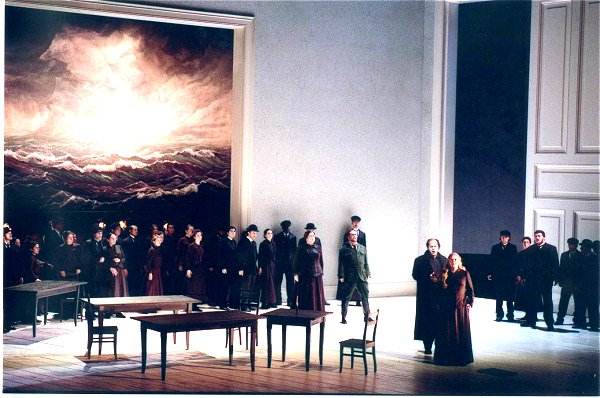S & H International Opera Review
Wagner, Der fliegende Holländer, Opéra de Paris-Bastille, April 30, 2002 (FC)
The opening night for the Dutchman’s boat to dock at the Paris stage could have been trouble. But talent and pluck saved the evening and finally produced a stirring reading of this work. This was the next opera in line following the lamentable Idomeneo at Palais Garnier, labeled "catastrophic" by Le Monde, and some worried when the experienced Wagnerian conductor, Jiri Kout withdrew not long before rehearsals were to start.
It was the young, fresh-faced conductor Daniel Klajner who saved the day. His main claim to international fame is his musical directorship of the city of Würzburg (it is off the autobahn between Frankfurt and Munich) and a tour of Spain with the Stuttgart Chamber Orchestra. He came to the attention of Hugues Gall, the Opéra boss, when he was called at the last minute to fill in for James Conlon, felled by hernia surgery, to conduct Rolf Liebermann’s final opera, Medea in February. That job was given because he was likely the only person on the planet to have actually conducted this work in the recent past.
He received favorable mention in the press for his work on Medea and his card was not yet culled from Gall’s Rolodex file when this next emergency arose. Conducting with confident assurance and musicality, he gave much dramatic emphasis to this work, here played without intermission. The orchestra responded to his baton with eager playing, including the not-always-so-committed brass. With a clear, firm beat, control of balances and attention to singers on stage, he impressed this listener more that many of the well-known names that frequently appear on the podium here. His conducting was perhaps a tad too cautious, but would be understandable under the circumstances.
The decisive musical leadership was a help to the cast of young singers, some of whom are making Paris debuts. Most impressive is the debut of Albert Dohmen in the title role. His strong, golden bass-baritone voice and his ability to etch his musical lines with detail and colour made his aria ‘Die Frist is um’ a veritable tour de force. Scheduled to sings Wotans in Berlin and Vienna, he seems clearly ready for operatic stardom.
Also worthy of special note is the splendid Senta of American soprano Susan Anthony who sailed through the music of this demanding role with ease. She has excellent vocal projection but, with her generic pronunciation of German, few of her words are clearly understandable. Strong performances were also turned in debuts by Barbara Bornemann as Mary and the bright tenor of Mathias Zachariassen as the Steuermann. Tenor Kim Begley seemed to be struggling to give a smooth reading of the role of Erik but Franz-Josef Selig is suitably gruff as Daland.
The production, by Willy Decker, premiered in 2000 at Bastille. With minimal stage business and simple but monumental sets, it still creates an effective backdrop for this early example of Wagner’s dramatic genius. There are eight performances at the Opéra Bastille until the May 24 and it will be broadcast on France Musiques on May 25.
Frank Cadenhead

Photo Eric Mahoudeau
 Return to:
Return to: